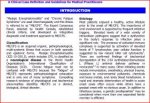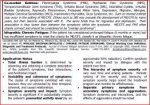G
Gerwyn
Guest
This is the content of Jason,s slide on the above subject.
Transition*to*ICD‐10:*Implications*for*ME/CFS*in*the*US
US*Clinical*Modification*of*ICD‐10*is*in*draft*stage,*set*to*be*implemented*in*2013
Classifies*ME*&*CFS*separately
ME*under‐Other*Disorders*of*the*Brain*
G93.3:*Post‐viral*fatigue*syndrome
Benign*myalgicencephalomyelitis*
(excludes*chronic*fatigue*syndrome*NOS*R53.82)
CFS*under‐General*Symptoms*&*Signs*
R53.82:*Chronic*fatigue*syndrome*NOS
(excludes*post‐viral*fatigue*syndrome*G93.3)
Are they seperate ilnesses? what are your thoughts on the matter.
Representatives of the CAA seemed to avoid mentioning any reference to neuroimmuneendocrine symptoms in their recent article
Do they think so too
The CDC have gone on record as saying they view ME and CFS as seperate illnesses
Transition*to*ICD‐10:*Implications*for*ME/CFS*in*the*US
US*Clinical*Modification*of*ICD‐10*is*in*draft*stage,*set*to*be*implemented*in*2013
Classifies*ME*&*CFS*separately
ME*under‐Other*Disorders*of*the*Brain*
G93.3:*Post‐viral*fatigue*syndrome
Benign*myalgicencephalomyelitis*
(excludes*chronic*fatigue*syndrome*NOS*R53.82)
CFS*under‐General*Symptoms*&*Signs*
R53.82:*Chronic*fatigue*syndrome*NOS
(excludes*post‐viral*fatigue*syndrome*G93.3)
Are they seperate ilnesses? what are your thoughts on the matter.
Representatives of the CAA seemed to avoid mentioning any reference to neuroimmuneendocrine symptoms in their recent article
Do they think so too
The CDC have gone on record as saying they view ME and CFS as seperate illnesses




